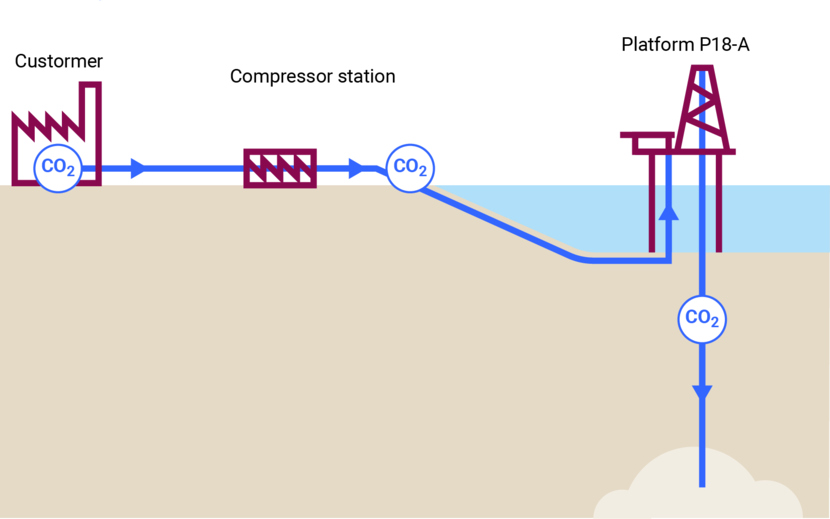Carbon storage under the North Sea
On profits under water
Carbon dioxide captured by industrial companies and pumped through a pipeline from Rotterdam to a depleted natural gas field under the North Sea is expected to make a significant contribution to the Netherlands’ climate goal for 2023. An audit by the Netherlands Court of Audit concludes that the Porthos project will be an effective instrument in the government’s climate policy. Calculations show that Porthos’s industrial customers will benefit most from higher CO2 prices, whereas the government should do better for itself.
Captured CO2 will be piped to platform P18-A and injected into a depleted natural gas field

The Court of Audit has investigated the project even though Porthos itself does not yet exist. The government intends to roll out more carbon capture and storage (CCS) projects as part of its climate policy. The audit report published on 28 March 2024 indicates that the ministers concerned should have paid more attention in advance to the allocation of this innovative project’s risks and benefits. Three state-owned enterprises, EBN, Gasunie and the Port of Rotterdam, are investing billions of euros in the project. Its customers are Dutch subsidiaries of British, American and French multinationals: Shell, Air Products, ExxonMobil and Air Liquide. The State of the Netherlands is also providing financial support for the project, the first large-scale, undersea carbon storage project.
Risks to the government indirectly during the project and directly after 2062
The state-owned enterprises will start building the infrastructure for this CCS project this year. Porthos will start pumping the CO2 into a depleted natural gas field under the North Sea in 2026. Setbacks will have indirect consequences for the government, as the state-owned enterprises will lower their dividend payments to it. The field will be filled and sealed in 2042. The customers will then no longer need to pay for the storage. Porthos will remain responsible for the field until 2062. The government will then assume responsibility for monitoring the field and for any costs due to CO2 leakages.
Government provides less funding but should do better for itself
The Porthos project’s carbon storage is efficient for the government because the grants it will award are less than the standard of €300 per tonne of CO2 avoided. The Minister for Climate and Energy has undertaken to award grants of up to €2.1 billion.
Calculations by the Court show that large-scale carbon storage under the North Sea is expected to be more economical for the government than ministers had foreseen. The higher the CO2 price, the lower the grants it will award to industry. The companies, however, will benefit far more than the government because they will need to surrender fewer EU emission allowances. They will emit less CO2 and the cost of the allowances is projected to rise. The return on the customers’ investment can rise to as much as 34%, even without grant funding. The government will not share proportionally in the higher revenues, even though the grant conditions and the Mining Act could have allowed it to do so. In view of the government’s long-term risk exposure, it is selling itself short. The Netherlands can apply the lessons learned from the Porthos project in future CCS projects.
The return projected for the state-owned enterprises that run the project will be lower. It will fall far short of their target return of 6.6%, partly because of delays and unforeseen costs.
Response of the ministers to the Court’s recommendations
The Court of Audit has made several recommendations. One of them concerns state-owned EBN’s participation in Porthos.
In the Court of Audit’s opinion, future CCS projects should pay more attention to a fairer allocation of risks and benefits.
Following a briefing for the House of Representatives’ Economic Affairs and Climate Policy Committee, the audit report was submitted to the House and published on this website.
Do you have any feedback about this audit?
We welcome all feedback on our audits. What do you think about the report? Do you have any questions or need more information? Mail us at feedback@rekenkamer.nl. We will read and consider all emails in confidence.